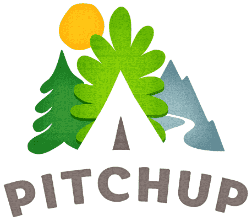Say toodle pip and pitch up close - a visitor etiquette guide to British camping
by
Laura Canning
| guides
 Welcome to Great Britain! We’re expecting hundreds of thousands of visitors to the UK for the
Olympic Games
, and we know that many of you will want to stay on a campsite to keep down costs and to experience British life at its best. Follow our ten etiquette tips in this camping guide to Britain so you can always be polite when pitching up:
Welcome to Great Britain! We’re expecting hundreds of thousands of visitors to the UK for the
Olympic Games
, and we know that many of you will want to stay on a campsite to keep down costs and to experience British life at its best. Follow our ten etiquette tips in this camping guide to Britain so you can always be polite when pitching up:
- Don’t worry too much about picking the perfect pitch. British campers are a famously friendly lot and prefer to pitch up as closely together as possible – in fact, on many campsites people will consider you rude if your tent doesn’t touch theirs. Ignore any apparent reticence from your camping neighbours if they don’t talk to you, as this will very likely be because of British reserve and shyness. Simply introduce yourself and ask them if they know your Facebook friend in London, if they’ve ever met the queen and how come they speak English so well.
- English people generally greet each other on campsites by saying ‘Toodle pip’. If the person looks a bit ‘rough’ or like someone you might see on a documentary about summer rioting, try Cockney rhyming slang instead. This is popular everywhere.
- British and Irish people love to talk about where they’re from, especially among the friendly atmosphere of campsites, so find out where your fellow campers are from and try your best to remember anything you might have heard about that place. If talking to Irish people, for example, be sure to get in a reference to leprachauns and refer repeatedly to ‘the craic’, with optional Riverdancing as an accompaniment. This amuses the Irish no end and will ensure lots of ‘craic’ as you sip your half pint of Guinness.
- Similarly, the Scots (or Scotch) love references to kilts, tartan and bagpipes, as well as inquiries as to whether they’ve ever seen the Loch Ness Monster. Bonus points for then saying ‘Or…Nessie’ and winking at them in a knowing manner. This is particularly effective when actually camping in Scotland .
- When a fellow camper says they’re from Wales , be sure to be polite by asking which part of England that’s in. Welsh people love to talk about their country, so don’t be shy.
- Don’t be afraid to use your own country’s slang and terms – British campers are very open-minded and enjoy learning new expressions from around the world. Viz., ‘fanny pack’.
- If staying in a caravan or lodge, people will be very interested to hear that such things are much bigger in your home country and that they are generally better equipped. More bonus points here for using the words ‘cute’ or ‘quaint’.
- Politics are also a popular topic of conversation, especially around the campfire. Engage your fellow campers in a spirited discussion of British politics and don’t be put off if they at first seem a little reluctant to engage – this is because they don’t want to cause offence. Good phrases to use here include ‘What’s a welfare state?’, ‘What does kettling mean?’ and ‘So, what’s up with that Boris Johnson guy?’
- Many campsites and holiday parks around the UK offer a wide variety of evening entertainment, which you should make every effort to go along to. It is customary on British campsites to buy a drink for everyone else in the bar – this is known as ‘buying a round’. If you end up drinking rather more than you’re used to back home, other campers will enjoy the chance of a loud sing-song as you stagger back to your tent.
- Do not be alarmed if occasional fights break out, especially at the end of the free evening entertainment and when combined with your generous drink-buying as referenced above. This is also a British tradition. You will be seen as a hero if you try to break the fight up, especially if there are more than two people fighting or if they are significantly bigger than you. However, be careful if someone uses the word ‘mate’ to you in this context, as in ‘What are you looking at, mate?’ Despite the use of ‘mate’, this person is not your friend.
Again, welcome to Great Britain, and have a great time on your campsite this summer! Toodle-pip!
